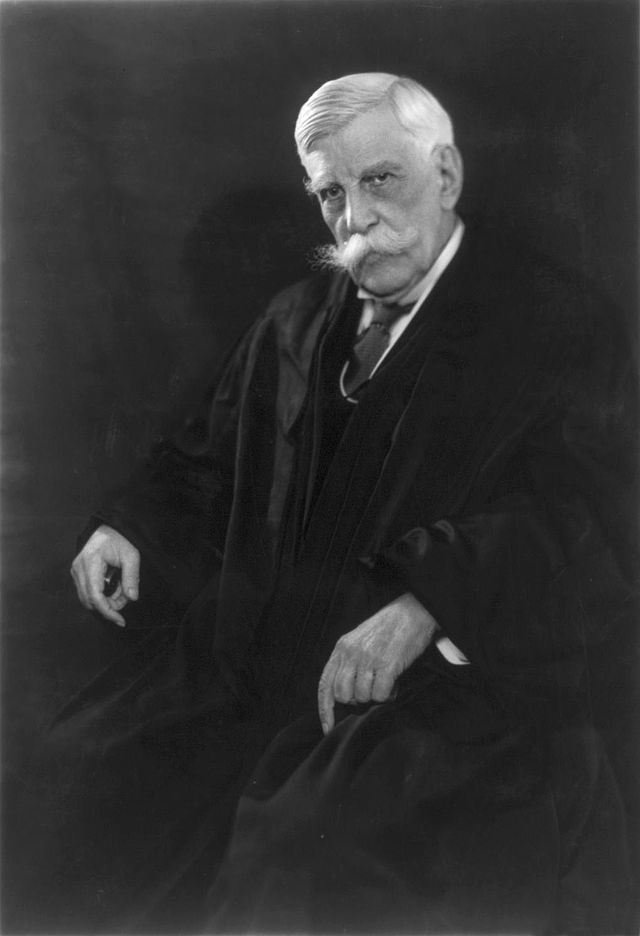A mind that is stretched by a new experience can never go back to its old dimensions.I recently came across a comment on Facebook in which someone wrote that he would not study Islam because no Muslim had ever died in the service of the United States. Of course, he was wrong and many Muslims have served this country in the military, and some have been killed while doing so. I was even more bothered by the wrong headed idea that one could only benefit from studying ideas of people like oneself.
Oliver Wendell Holmes, Jr.
I recently came across this:
Shortly after his retirement from the bench in 1933, Supreme Court Justice Oliver Wendell Holmes Jr was paid a courtesy call by President Franklin Roosevelt who was surprised to find Holmes reading Plato's Symposium in the original Greek. Roosevelt asked Holmes why he was bothering to study Greek. Holmes, who was then 92 years old, replied, 'Why? To improve my mind."Of course, Oliver Wendell Holmes Jr, did serve in our country's army. As a young officer in the Union army, he was wounded at Ball's Bluff -- the closest battle to my home, the first battle of the Civil War, and the only battle in U.S. history in which a serving U.S. senator was killed. He was also wounded at Antietam, the bloodiest single day in American military history. He was wounded a third time at Chancellorsville. Like many Union soldiers, he suffered from (a near fatal case of) dysentery.
He is much more famous as a judge, serving as both a Justice and Chief Justice of the Massachusetts Supreme Court and for 30 years as a Justice of the United States Supreme Court. He was known as "the Great Dissenter" for his many dissenting opinions written at the U.S. Supreme Court. He was perhaps the most scholarly of all 20th century Supreme Court justices, and his opinions were perhaps the most influential on the Court for the rest of the 20th century. Many of the positions he advocated in dissent later became the majority opinions of the Court and the law of the land.
So why did he read Plato in the original Greek? Of course, Plato was one of the greatest thinkers in human history -- one of very few whose thinking has been studied for a couple of thousand years. And of course, reading in a foreign language exercises the mind in a different way than does reading in your native language, the language you speak every day and usually read and write in.
I don't understand Greek, and my junior high school Latin was never much good and is long forgotten. I do read Spanish, French and Portuguese. I feel that reading things written in these languages rather than in translation I sometimes see nuances that are not available in the English translation. Of course, one does not get the flow of the original language when reading poetry in translation, and in poetry it is how something is said as well as the nominal meaning of the words that counts. So reading Plato in the original Greek would presumably improve Holmes' mind more and differently than reading him in English translation.
The Facebook comment is especially wrong because its author failed to realize that by studying a culture other than his own he would have new experience, would experience the world in a new way. He would stretch his mind. If Holmes at 92 was still seeking to improve his mind, who are we to stop short at much younger age?
Moreover, in this smaller world, it well behooves us to understand other cultures, and a good place to start is by trying to understand the religions that they follow. It is easier to live in peace and harmony with others when you understand them.
Here are some other pieces of wisdom from OWH Jr.:
- A mind that is stretched by a new experience can never go back to its old dimensions.
- The language of judicial decision is mainly the language of logic. And the logical method and form flatter that longing for certainty and for repose which is in every human mind. But certainty generally is illusion, and repose is not the destiny of man.
- The main part of intellectual education is not the acquisition of facts, but learning how to make facts live.
- If there is any principle of the Constitution that more imperatively calls for attachment than any other it is the principle of free thought, not free thought for those who agree with us but freedom for the thought that we hate.
- A word is not a crystal, transparent and unchanged; it is the skin of a living thought and may vary greatly in color and content according to the circumstances and time in which it is used.
- Even for practical purposes theory generally turns out the most important thing in the end.
- Every idea is an incitement... eloquence may set fire to reason.
- Certitude is not the test of certainty. We have been cocksure of many things that were not so.
- Most of the things we do, we do for no better reason than that our fathers have done them or our neighbors do them, and the same is true of a larger part than what we suspect of what we think.

No comments:
Post a Comment